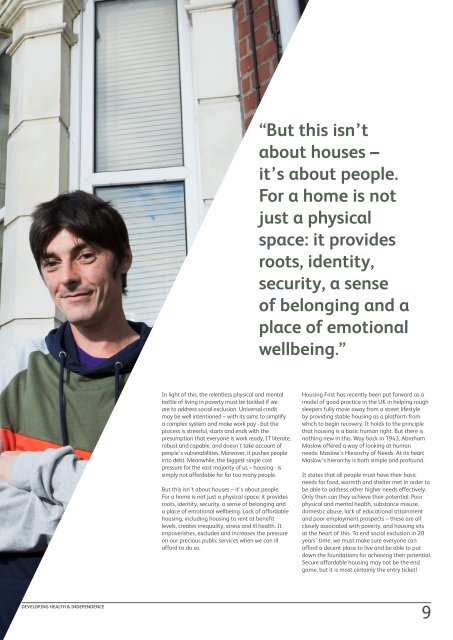The Vision Project
Throughout 2019, Developing Health & Independence (DHI), have been marking their 20th anniversary as a charity by looking to the future. Through articles, events and podcasts, they've asked people to answer the question of how we can achieve their vision of ending social exclusion. This collection of articles includes the contributions of experts from across public life and the political spectrum.
Throughout 2019, Developing Health & Independence (DHI), have been marking their 20th anniversary as a charity by looking to the future. Through articles, events and podcasts, they've asked people to answer the question of how we can achieve their vision of ending social exclusion. This collection of articles includes the contributions of experts from across public life and the political spectrum.
Create successful ePaper yourself
Turn your PDF publications into a flip-book with our unique Google optimized e-Paper software.
“But this isn’t<br />
about houses –<br />
it’s about people.<br />
For a home is not<br />
just a physical<br />
space: it provides<br />
roots, identity,<br />
security, a sense<br />
of belonging and a<br />
place of emotional<br />
wellbeing.”<br />
In light of this, the relentless physical and mental<br />
battle of living in poverty must be tackled if we<br />
are to address social exclusion. Universal credit<br />
may be well intentioned – with its aims to simplify<br />
a complex system and make work pay - but the<br />
process is stressful, starts and ends with the<br />
presumption that everyone is work ready, IT literate,<br />
robust and capable, and doesn’t take account of<br />
people’s vulnerabilities. Moreover, it pushes people<br />
into debt. Meanwhile, the biggest single cost<br />
pressure for the vast majority of us – housing - is<br />
simply not affordable for far too many people.<br />
But this isn’t about houses – it’s about people.<br />
For a home is not just a physical space: it provides<br />
roots, identity, security, a sense of belonging and<br />
a place of emotional wellbeing. Lack of affordable<br />
housing, including housing to rent at benefit<br />
levels, creates inequality, stress and ill health. It<br />
impoverishes, excludes and increases the pressure<br />
on our precious public services when we can ill<br />
afford to do so.<br />
Housing First has recently been put forward as a<br />
model of good practice in the UK in helping rough<br />
sleepers fully move away from a street lifestyle<br />
by providing stable housing as a platform from<br />
which to begin recovery. It holds to the principle<br />
that housing is a basic human right. But there is<br />
nothing new in this. Way back in 1943, Abraham<br />
Maslow offered a way of looking at human<br />
needs: Maslow’s Hierarchy of Needs. At its heart<br />
Maslow’s hierarchy is both simple and profound.<br />
It states that all people must have their basic<br />
needs for food, warmth and shelter met in order to<br />
be able to address other higher needs effectively.<br />
Only then can they achieve their potential. Poor<br />
physical and mental health, substance misuse,<br />
domestic abuse, lack of educational attainment<br />
and poor employment prospects – these are all<br />
closely associated with poverty, and housing sits<br />
at the heart of this. To end social exclusion in 20<br />
years’ time, we must make sure everyone can<br />
afford a decent place to live and be able to put<br />
down the foundations for achieving their potential.<br />
Secure affordable housing may not be the end<br />
game, but it is most certainly the entry ticket!<br />
DEVELOPING HEALTH & INDEPENDENCE<br />
9




